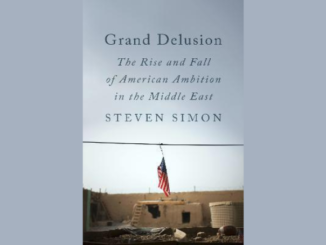
In an article on Telesur as far back as December 2017 reporters cited Glenn Greenwald’s observation that an increase in Israeli military repression of Palestinian citizens was joined by what Greenwald called a “censorship rampage” designed to delete as many Palestinian accounts as possible.
In a more recent article titled “Censored and Surveilled,” the authors asked if social media is a “safe space” for Palestinians, given the likelihood that you might get arrested and charged with “incitement” for writing something that the Israeli government does not like.
What makes the case of Dr. Rima Najjar’s banning from Quora different? It’s different because she is fighting back not just for her right to free speech, but for the voices of all Palestinians silenced by what Telesur calls “social media imperialism.”
On May 2, 2019, both Rima Najjar, a Palestinian retired professor from Al-Quds University, and I were banned from Quora, where we were co-administering two “Spaces” devoted to Palestine-related topics. Quora is a question/answer social media platform and “Spaces” are innovative sites similar to “Groups” on Facebook that Quora is experimenting with.
Rima Najjar is now preparing to sue Quora for discrimination, because, as her lawyer Rima Kapitan writes in the settlement letter, Najjar’s ban is based solely on “her advocacy for Palestinian rights through her opposition to Zionism” and for “unlawfully deny[ing] her access to a place of public accommodation on the basis of Dr. Najjar’s national origin.”
In lieu of litigation, Najjar proposed (among other demands) that Quora reinstate her account as well as mine, which was banned, not for my content, but simply because I supported Dr. Najjar and reposted one of her posts.
In her legal letter, Kapitan refers to California’s public accommodations law which provides “full and equal accommodations, advantages, facilities, privileges, or services in all business establishments of every kind whatsoever” regardless of “national origin.”
This Act includes websites such as Quora because it is “a kind of business establishment” that falls under the realm of public accommodation. Moreover, Title II of the Civil Rights Act of 1964, that commonly refers to racial and/or gender discrimination also includes as a category “national origin.”
When Quora banned Dr. Najjar on May 2, it did so, as Kapitan argues, because of her national origin—Palestinian.
Specifically Quora claimed that Najjar engaged in “hate speech” for using the term “Zionist,” because she had previously written about the term in a less than positive way, thus violating Quora’s “Be Nice, Be Respectful” policy that, in fact, is used to discriminate against Palestinians, giving those who deny their Palestinian nationality a free pass.
During her time on Quora, Dr. Najjar experienced what Kapitan terms “a concerted campaign of harassment and censorship by Zionists and Israelis” who targeted her for content. Moreover, as noted above, this campaign might have been under the directive of the Israeli government, as journalists have documented its legion of paid individuals whose job is solely to attack anyone with a different point of view.
For example, written by Varda Epstein for The Israel Forever Foundation, “Quora: The New Battlefront for Israel” describes how Epstein “fight[s] back” against pro-Palestinian voices on social media.
Described throughout in military terms, Epstein explains:
“I look at a question like that and the wheels start turning in my mind. My fingers itch to type. I want to answer that in such a way that my Israel-loving bias will obliterate the anti-Israel bias expressed in that question. Because this is war, Habibi.”
Here Epstein puts her words into action. In response to a question asking why there is so much violence between Palestinians and Israeli settlers she responds:
“The question is by way of asserting an untruth: that there is some sort of mutuality to the Arab war against the Jews (see: The Arab War Against the Jews). Jews don’t attack Arabs. The opposite is true: Arabs attack Jews.”
Epstein then moves on to deny the very existence of Palestinians:
“The term “Palestinian” is also a piece of propaganda, as there has never been a sovereign Arab state known as “Palestine.” The term is used only to delegitimize the State of Israel, the Jewish State and in reality has no meaning.”
Documenting this behavior, a recent article in Mondoweiss explains that Israel has launched a new recruitment drive for “social media warriors” shortly after its companies were exposed for just such spreading disinformation.
Indeed, according to several reports cited in the article Palestinians on social media can expect to receive a staggering number of insulting posts in a very short period of time. On Quora, I can personally attest that this is true not only for Palestinian voices but their Jewish supporters like me.
Despite obstacles, Dr. Najjar spent a great deal of time appealing moderation decisions and wrote many well-researched answers to counter the hasbara cited above.
In a recent interview with Nada Elia of Mondoweiss, she explains why she persevered:
“I write on Quora because I have a strong desire to integrate Palestinian rights into the Quora universe, based on universal rights and the need for justice, equality and freedom for all people.”
By erasing her voice, Quora erases her nationality, she continues, much the same way that Epstein does above, all in an effort to ethnically cleanse Palestinians in order to make way for the Jewish state.
After Dr. Najjar received notice of a permanent ban, I posted an article that she wrote on Medium recapping her experience. Shortly after, I received notice of a ban, too. Clearly, my expulsion was not because of my own content, but that of Dr. Najjar, who throughout this process was harassed, edit-banned and otherwise intimidated far more than I was myself.
I believe that this is an important issue for several reasons. In an article entitled “Advocacy for Palestine on Social Media: An Instrument of Change,” Nour Odeh explains that such work for Palestinians has been crucial for many decades, long before the advent of social media.
With the introduction of that venue, though, the internet provided Palestinians and their supporters an invaluable alternative to corporate media which has been one-sided in its coverage of the Occupation.
Nevertheless, Odeh explains, the increasing use of “bots” or paid accounts to intimidate pro-Palestinian voices has made things difficult, especially since the Israeli army and government have hired university students to serve as their “electronic army.”
Whether this happened on Quora or not we are not sure, but the number of attacks from Zionist writers was staggering. If Dr. Najjar wins this case, perhaps that form of harassment might be brought under control by more acceptable Quora policies.
Just as worrying, when hasbara runs rampant on these sites, it might contribute to an increase in crimes not just against Palestinians but all people of color. Moreover, it appears that misinformation is being posted at an alarming rate, making it difficult to counter with truth.
Far from admitting defeat, Dr. Najjar’s legal letter to Quora could set a precedent for legal battles in the future over such free speech issues, as well as demonstrate that Palestinians and their supporters are not willing to tolerate propaganda passing for truth. Without voices like hers, writers like Epstein, who is quite prolific, are free to verbally cleanse the landscape of Palestinians altogether.
Even if Dr. Najjar loses, though, this incident provides an opportunity to educate the public about the length propagandists are willing to go to silence opposing voices. There is already a literal war against journalists in Gaza, as well as in Mexico and Honduras, to name a few. This makes Najjar’s case even more urgent because it is partly through words like hers that the struggle will be won.
– Benay Blend received her doctorate in American Studies from the University of New Mexico. Her scholarly works include Douglas Vakoch and Sam Mickey, Eds. (2017), “’Neither Homeland Nor Exile are Words’: ‘Situated Knowledge’ in the Works of Palestinian and Native American Writers”. She contributed this article to The Palestine Chronicle.







